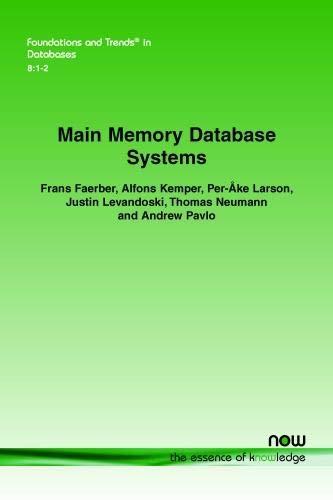Question
Ocaml Programing with obvious comments. 1. Write a function get_prefix_eq_int : int -> int list -> int list that returns a list consisting of only
Ocaml Programing with obvious comments.
1. Write a function get_prefix_eq_int : int -> int list -> int list that returns a list consisting of only the number that is its first argument; for as many as there are in the prefix to (start of) its second argument: get_prefix_eq_int 1 [1;1;3;4;1] = [1;1]. get_prefix_eq_int 2 [1;1;3;4;1] = []. get_prefix_eq_int 3 [3;3] = [3;3].
2. Write a function drop_prefix_eq_int : int -> int list -> int list that returns a list consisting of all elements in the second list with any occurrences of its first argument dropped at the start: drop_prefix_eq_int 1 [1;1;3;4;1] = [3;4;1]. drop_prefix_eq_int 2 [1;1;3;4;1] = [1;1;3;4;1]. drop_prefix_eq_int 3 [3;3] = [].
3. Write a function group_eq_int : int list -> int list list that returns a list of lists in which equal consecutive elements are grouped in a list. group_eq_int [1;1;3;4;1] = [[1;1];[3];[4];[1]]. group_eq_int [1;1;1;3;3;3;5;5;5;5] = [[1;1;1];[3;3;3];[5;5;5;5]].
4. Write a function group_eq : 'a list -> 'a list list that returns a list in which equal consecutive elements are grouped in a list. You might need some helper functions. group_eq [1;1;3;4;1] = [[1;1];[3];[4];[1]]. group_eq [1;1;1;3;3;3;5;5;5;5] = [[1;1;1];[3;3;3];[5;5;5;5]]. group_eq ["baby"; "shark"; "doo";"doo";"doo";"doo"] = [["baby"];["shark"];["doo";"doo";"doo";"doo"]].
Step by Step Solution
There are 3 Steps involved in it
Step: 1

Get Instant Access to Expert-Tailored Solutions
See step-by-step solutions with expert insights and AI powered tools for academic success
Step: 2

Step: 3

Ace Your Homework with AI
Get the answers you need in no time with our AI-driven, step-by-step assistance
Get Started


